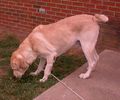 This is Bear. He's nibbling at the grass here. For over one year he has had frequent episodes of vomiting. Sometimes it's just a little fluid, sometimes undigested food, sometimes a little grass, or a combination of the above.
This is Bear. He's nibbling at the grass here. For over one year he has had frequent episodes of vomiting. Sometimes it's just a little fluid, sometimes undigested food, sometimes a little grass, or a combination of the above.
He came to see us after having numerous unsatisfactory attempts at treatment. "I'm here for a second opinion." Third, actually. My associate spent a long time getting the past medical history, everything that has been tried and the results (or lack of them) of those efforts. That's par for the course when you are giving a "second opinion".
The "second opinion" case is not something I really look forward to, at least not when something has been going on for a year. This suggests that the problem is not simple nor straightforward, and it probably isn't going to "fix itself". If any of those were the case, I wouldn't be seeing it.
So, more often than not, you spend a long time extracting the history, and documenting it, and concluding that the other doctor has been very thorough and done everything you can think of and it did not work. Oh, I can hardly wait to see one of these cases. They really ought to be seeing a specialist, but they are seeing me instead. Hard to be a hero on these.
Of course, sometimes you just have a different point of view than the other guy (gal). After working with a case for a long time, you can get tunnel-vision. You have made that initial assessment and it biases everything you do after that. So, a fresh pair of eyes (and ears) sometimes has an easier time finding a fresh perspective on the case.
My associate started over with basic lab tests. Some had been done before, some hadn't. At any rate, we needed to see where Bear was at present. We might get a clue. [In a referral situation, they recommend a "minimum database", which includes a complete blood count, biochemistry profile of 12 to 20 tests, a stool exam and a urinalysis.] In this case, there was nothing in the data to suggest a specific diagnosis.
 Bear's owner said, "Just keep him a couple of days until you find out what it is. I'm tired of going round and round with this." So now it's my turn. Hey, no pressure.
Bear's owner said, "Just keep him a couple of days until you find out what it is. I'm tired of going round and round with this." So now it's my turn. Hey, no pressure.
Ah, but here was that rare case. There is a logical progression of diagnostic tests. I can see what has already been done, I can see what hasn't worked. I don't have to do any of that over again myself, and there is a clear next step.
Vomiting food that isn't digested. Maybe it isn't even getting to the stomach. "Have you tried feeding him with his dish elevated? Does it make a difference?" Well, yes they have, and maybe it does.
 So, I take an X-ray of his chest. You can't tell much about his esophagus, but his trachea (windpipe) looks pushed down out of place a little. Then I mixed a little barium with some dog food and Bear scarfed it right down.
So, I take an X-ray of his chest. You can't tell much about his esophagus, but his trachea (windpipe) looks pushed down out of place a little. Then I mixed a little barium with some dog food and Bear scarfed it right down.
Now, your esophagus is firm, small, muscular tube (when it's normal). It squeezes the food right on down to your stomach without the aid of gravity. If you stand on your head, it squeezes the food right on up to your stomach when you swallow. [I tried that in seventh grade. I used a pillow under my head, and leaned against a wall so I wouldn't fall, and I used a straw to drink the water. It worked.] The food goes right on down (or up) in a hurry. Unless you have mega-esophagus.[Follow the link to a discussion on Veterinary Partner.]
 Bear has mega-esophagus. He's had it all along. I found it with the first test I ran. All that food should be in his stomach, not in his chest. I look like a genius, but it's just the luck of the draw. It's one of those rare occasions when being the "third opinion" doesn't turn out to be a major frustration.
Bear has mega-esophagus. He's had it all along. I found it with the first test I ran. All that food should be in his stomach, not in his chest. I look like a genius, but it's just the luck of the draw. It's one of those rare occasions when being the "third opinion" doesn't turn out to be a major frustration.
Since Bear's esophagus is a big flabby sack (instead of a firm, muscular tube), and further testing shows no thyroid problems and no myasthenia gravis (possible causes), he will have to rely on gravity. From now on, he gets to eat while standing on his hind legs. Some fun, huh? Too bad the "genius" can't cure what I diagnosed.


Interesting-never heard of that one. Poor dog. I read the link, that Bailey chair looks like a nifty invention but I imagine it’d be hard to train a dog to use it.
This is a really interesting post, and I haven’t heard of that particular issue before. Even if you can’t cure it, at least there’s enough to improve the dog’s quality of life.